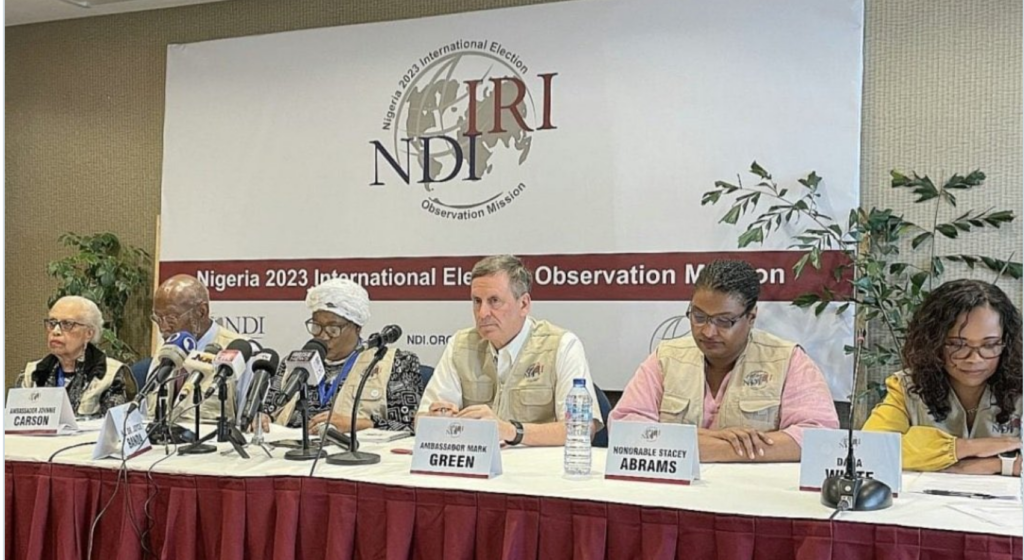
Credit: IRI/NDI Twitter.
Nigeria’s main opposition parties are calling for fresh elections, describing results currently being announced by electoral body as “heavily doctored and manipulated,” in a joint press conference in the capital, Abuja, CNN reports:
They said their parties would no longer be part of the ongoing collation process in the capital Abuja and added they had lost confidence in the electoral body Chairman Mahmood Yakubu, said a joint statement from the Peoples Democratic Party, Labour Party, and African Democratic Congress in Abuja on Tuesday. The parties called for new polls to be held under a new chairman for the Independent National Electoral Commission (INEC).
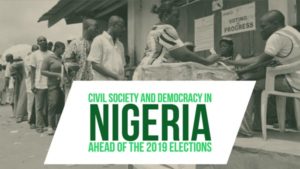 Their request for the vote to be cancelled was not immediately addressed by the electoral body raising concern about growing tensions ahead of May when the new government is meant to be sworn in, Associated Press adds.
Their request for the vote to be cancelled was not immediately addressed by the electoral body raising concern about growing tensions ahead of May when the new government is meant to be sworn in, Associated Press adds.
“If elections are cancelled and we have to start over again May 29 may no longer be sacrosanct which might lead to the declaration of a state of emergency and an interim national government,” said Hassan Idayat, head of the Center for Democracy and Development, Nigeria’s largest democracy-focused group.
“The election fell well short of Nigerian citizens’ reasonable expectations,” said a joint observer mission (above) of the International Republican Institute (IRI) and National Democratic Institute (NDI).
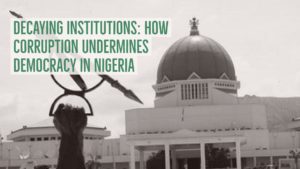 “Disappointing is definitely the word. There were many of the usual flaws, scattered violence, late opening of polls and logistical difficulties, machine politics, all compounded by the totally unnecessary currency crisis and fuel shortage,” said Dave Peterson, Africa Program Director at the National Endowment for Democracy (NED), and a member of the Joint Mission. “Having said that, these were probably the best Nigerian elections out of seven I have observed.”
“Disappointing is definitely the word. There were many of the usual flaws, scattered violence, late opening of polls and logistical difficulties, machine politics, all compounded by the totally unnecessary currency crisis and fuel shortage,” said Dave Peterson, Africa Program Director at the National Endowment for Democracy (NED), and a member of the Joint Mission. “Having said that, these were probably the best Nigerian elections out of seven I have observed.”
“There can be no denying Nigeria is a democracy, however flawed it may be,” he added. “The popular enthusiasm and commitment to the process, the mostly peaceful competition, the engagement of civil society, the general dedication of the electoral commission and its staff, the demand for democracy and the expectation of Nigerians that they deserve better and can do better, all give me hope.”
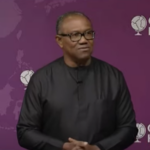
Credit: Chatham House
In one major upset, the Labour Party’s Peter Obi (right) beat Bola Tinubu of the ruling All Progressives Congress in his home state by winning the most votes in Lagos, the country’s economic capital, The Wall Street Journal adds.
The megacity of some 23 million people was at the center of the October 2020 #EndSARS protests, which started out as demonstrations against police violence but quickly morphed into a broader rebellion against Nigeria’s economic elite.
The election’s ramifications are potentially global, observers suggest.
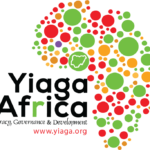 “The international attention that is given to the situation in Nigeria is borne out of this very strong conviction that, if we get it right when it comes to democratic transition in Nigeria, the rest of Africa will also get it right,” said Chris Kwaja, the US Institute for Peace’s interim country manager in Nigeria and a senior lecturer at Modibbo Adama University’s Centre for Peace and Security Studies.
“The international attention that is given to the situation in Nigeria is borne out of this very strong conviction that, if we get it right when it comes to democratic transition in Nigeria, the rest of Africa will also get it right,” said Chris Kwaja, the US Institute for Peace’s interim country manager in Nigeria and a senior lecturer at Modibbo Adama University’s Centre for Peace and Security Studies.
Transformation in Nigeria “matters and can have a real impact on the development of democracy in West Africa, across Africa, and around the world,” said Damon Wilson, president of the National Endowment for Democracy (NED). During a recent trip to Nigeria, Wilson witnessed how international support is enabling civic actors like Yiaga Africa to coordinate a massive national effort to monitor elections, he wrote for TIME magazine.
It is Official! The international observers have confirmed
“Nigerian 2023 Election lack transparency by the INEC”NDI/IRI/JEOM Observers
IRI – The International Republican Institute
NDI – National Democratic Institute
JEOM – Joint Election Observation Mission pic.twitter.com/SLNgjtwKYI— DrUmaru_AJ (@Princeujay) February 27, 2023







